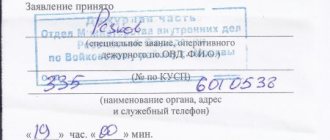Lawyer Spiridonov M.V.
12/12/2015 0 Comments Criminal cases
active repentance, theft from a store, charges of theft, termination of a criminal case, Art. 158 Criminal Code of the Russian Federation, Art. 28 Code of Criminal Procedure of the Russian Federation, Art. 75 uk rf
Recently, the number of crimes of minor and medium gravity has increased. Persons brought to criminal liability in these categories of cases have the right to terminate the criminal case on two main grounds:
1) Termination of a criminal case due to reconciliation of the parties;
2) Termination of the criminal case due to active repentance;
(note - at the moment, it is possible to terminate a criminal case for crimes of minor and medium gravity by imposing a criminal law measure in the form of a court fine).
I talked about the legal aspects and legal advice regarding the termination of a criminal case in connection with the reconciliation of the parties in my article at the link here, and also described a specific case on the website of the professional community of lawyers and advocates Pravorub.ru at the link here, which was terminated due to with reconciliation of the parties without admitting guilt.
The law contains the following conditions for termination of a criminal case on the specified basis.
According to Part 1 of Art. 75 of the Criminal Code of the Russian Federation, a person who has committed a crime of minor or moderate gravity for the first time may be released from criminal liability if, after committing the crime, he voluntarily confessed, contributed to the disclosure and investigation of the crime, compensated for the damage caused or otherwise made amends for the harm caused as a result of the crime, and, as a result of active repentance, ceased to be socially dangerous.
Paragraph 4 of the Resolution of the Plenum of the Supreme Court of the Russian Federation dated June 27, 2013 No. 19 “On the application by courts of legislation regulating the grounds and procedure for exemption from criminal liability” determines that, within the meaning of Part 1 of Article 75 of the Criminal Code of the Russian Federation, exemption from criminal liability in connection with active repentance is possible with provided that all the actions listed in it are performed or those of them that, taking into account specific circumstances, the person had an objective opportunity to perform:
(for example, detention at the scene of a crime objectively excludes the possibility of reporting to law enforcement agencies about a crime committed, however, the person’s subsequent assistance in solving and investigating the crime, compensation for damage and (or) making amends for harm in other ways may indicate his active repentance).
Courts should keep in mind that active repentance can lead to release from criminal liability only if the person as a result has ceased to be socially dangerous. When resolving the issue of a person’s loss of public danger, it is necessary to take into account the entire set of circumstances characterizing the person’s behavior after committing a crime, as well as data about his personality. At the same time, a person’s admission of his guilt without performing the actions provided for by this norm does not constitute active repentance.
In what cases are criminal prosecutions terminated?
Article 27 of the Code of Criminal Procedure of the Russian Federation is devoted to situations when cases are terminated. It is assumed that the prosecution and the open case have already been organized. Any ruling that terminates a case has legal consequences. You can’t do without material ones. Therefore, a decision is made only if there are grounds listed in the current legislation.
The grounds for termination of a criminal case are presented in the following list:
- The judge made a verdict to refuse to initiate criminal proceedings or to terminate the current proceedings.
- The criminal received amnesty.
- Members of the State Duma did not consent to the prosecution.
- Lack of a statement from the victim himself about what happened. Persecution does not change if the victims of the crime were completely defenseless.
- The suspect died. An exception to the rules is made only if it is necessary to protect the good name of the victim who has died.
- The limitation period has ended.
- Evidence has emerged that an act was not committed in a situation subject to review.
- The fact was revealed that the citizen was not involved in criminal activity. Then the termination of criminal proceedings will be legal.
There must be clear grounds for the proceedings to be truly suspended. The procedure for terminating a criminal case also requires proper implementation.
Even the proven guilt of a citizen does not exclude the possibility of termination of the criminal case. This usually happens if the following conditions are met:
- The accused and the victim of the crime have reconciled with each other.
Article 25 of the Code of Criminal Procedure of the Russian Federation describes this case in detail. Permissible for minor or moderate offenses. An important condition is consent from the victim and the transfer of full compensation to him.
- Active repentance.
The most detailed description of the situation is given in Article 28 of the Code of Criminal Procedure of the Russian Federation. Permissible for people whose crime is of minor gravity. Article 75 of the Code of Criminal Procedure of the Russian Federation describes the enforcement of the current norm. Relevant in case of a misdemeanor, but in the future – with a report to the police, assistance with the investigation. And the agreement to compensate for the damage in full, which was followed by the termination of the criminal case and criminal prosecution.
Only the presence of appropriate rights allows the authorities to make decisions. Usually these are investigative bodies, prosecutors and court representatives. It is imperative to draw up an act that is subject to additional study and control. In practice, the complexity of the process of closing cases increases. The reason is the participation of several authorities at once.
Termination of a criminal case entails termination of criminal prosecution
No crime event
The issue is described in detail by Article 24 of the Code of Criminal Procedure of the Russian Federation. The problems are related to the lack of a clear concept of crimes and events. An equal sign is often put between them, but this is wrong. These are different reasons and conditions.
A separate category is corpus delicti. Here we mean lists with events that characterize the characteristics of the object of the criminal party, an objective action. In the absence of these events, liability is excluded.
In practice, it is often possible to encounter situations where the prosecution and case are terminated without finding evidence of criminal activity. Here is a list of the most common:
- No crime. For example, a statement about missing property has been filed. But the reason turned out to be completely different. Things have been forgotten or thought to be in other places.
- The fact of the crime has been proven, but is associated with natural events that do not depend on anyone. For example, if a warehouse caught fire after a lightning strike, any criminal prosecution is excluded.
- The actions of the victim themselves led to negative consequences, which is confirmed by criminal procedure legislation. There is no guilt towards other people. A striking example is suicide.
There are more situations; examples that have become widespread are described above.
Lack of crime
The missing elements of crimes are described by the first part of Article 24 of the Code of Criminal Procedure of the Russian Federation. We are talking about cases where it is proven that a specific person committed an action. But by all indications, this action cannot be classified as a crime. The emergence of grounds is associated with the following circumstances:
- Signs of a criminal act are present. But it has little significance. Therefore it does not pose a danger to the general public.
- One of the elements of the crime is completely missing. For example, when many crimes are committed due to negligence.
- There is an act that is dangerous to society, but without consequences in the form of persecution. The application of other types of responsibility, administrative, is typical. We are talking about hooliganism and theft on a not very large scale, and other similar actions.
Chapter 8 of the Criminal Code provides additional grounds for refusal to prosecute in criminal cases.
Reconciliation of the parties, absence of a statement from the victim
Starting cases without statements from the victim leads to immediate termination. An exception is made for the participation of persons vested with appropriate authority.
Reconciliation between the victim and the accused may serve as a basis for terminating the criminal case
The parties can agree among themselves what is sufficient to terminate the cases, as stated in Article 25 of the Code of Criminal Procedure of the Russian Federation.
But only the presence of the following factors makes the option acceptable:
- The accused does not object.
- Consent from investigative and inquiry authorities. Particularly important for officials responsible for management.
- The harm caused is made up for, in any suitable form.
- The victim wrote a statement about actual reconciliation.
- Previously, there were no crimes committed by citizens.
- Level of severity – small, medium.
If you look at the second part of Article 20 of the Code of Criminal Procedure of the Russian Federation, you will notice the words about the absence of additional requirements in the case of reconciliation between the parties. But only private prosecution falls under the rule. Then the end of the preliminary investigation may proceed differently.
Repentance of an active nature is a basis that deserves separate consideration. The option is relevant if the violation is the first, there is remorse, and so on. The practice of terminating cases has become widespread.
Death of a suspect
The death of a suspect is a mandatory condition under which any proceedings against a citizen are terminated. An exception is if the deceased cannot otherwise be rehabilitated. It is impossible to make decisions on cases without officials receiving certificates from the registry office of the relevant content.
The case is allowed to be terminated even if an appropriate decision is issued stating the death of the citizens.
Active repentance of the accused
This has already been written above. The reason is the first violation, the presence of repentance. The prosecution is over if the accused shows remorse.
Lapse of time
The statute of limitations for closing a criminal case depends on the severity of the offense
78 – the number of the article of the Code of Criminal Procedure of the Russian Federation, which describes the statute of limitations applicable in this direction. The third paragraph of the first part of Article 24 of the Code of Criminal Procedure of the Russian Federation is devoted to specific grounds and termination processes.
Criminal liability is removed from persons if too much time has passed since the crime:
- In case of extreme severity – 10 years.
- For serious crimes - 10 years.
- 6 years for crimes of medium gravity.
- 2 years with slight severity.
The minor age of the suspects leads to a reduction in the specified terms by half.
Rules on statute of limitations should not depend on inferences or personal views of persons with appropriate authority. After a specific specified time, the grounds for persecution disappear. Exceptions to the rules are made only for punishments in the form of the death penalty or life imprisonment. The statute of limitations does not apply when organizing preliminary investigations.
The Criminal Code provides a description of other situations without statute of limitations. This usually concerns crimes against peace and humanity.
The calculation begins from the moment the offense is committed. Evasion from prosecution and control authorities with a known personality leads to the abolition of the statute of limitations.
Even the expiration of the statute of limitations does not deprive the accused of the right to appeal the formalized decision. If such an action is carried out, the official is obliged to resume the process and begin proceedings in the general manner. Thanks to this, innocent persons can restore their lost reputation. The criminal case is terminated on the grounds stated above.
Rehabilitative grounds for termination of cases
The peculiarity of the measure is easy to recognize by its name. The following reasons give citizens the right to rehabilitation:
- There is no corpus delicti in the actions of a civilian.
- The crime event has not been confirmed. It's not perfect.
- It was found that the citizen was not initially associated with the crime.
In addition to the right to rehabilitation, the citizen is given additional guarantees:
- Carrying out actions to eliminate the consequences, to compensate for the damage.
- Rights are restored, the rule applies to housing, pensions, and work.
- Property damage subject to compensation.
Proven guilt does not matter - the state is responsible for compensation for damage in any case.
Specific individuals may be found guilty - the prosecutor and the investigator, and so on. But no one bears personal responsibility.
Similar measures are available to persons in the following categories:
- Drug treatment for which there was no basis or evidence.
- Convicts, in the case of partial or complete reversal of a court sentence.
- Use of Articles 24 and 27 of the Criminal Code when recognizing the status of the accused.
- Citizens against whom the accusers have renounced their claims.
- Acquitted defendants.
The right to rehabilitation is not granted under other circumstances.
Termination of a criminal case on non-rehabilitative grounds
These grounds include all other factors listed above and earlier. Only the consent of the accused himself allows obtaining the status of an innocent person. Death presupposes permission for such actions from relatives.
The accused should always have hope of ending the case.
Receiving compensation: features of the procedure
Such processes cannot come from the law enforcement agencies that initiated the proceedings.
There are two situations with the termination of criminal proceedings:
- Decision-making by the person organizing investigative activities.
- The decision was issued by the court hearing the case.
The right to compensation requires confirmation from the authorities that organized the process. Therefore, you must first contact representatives of these authorities by writing a written application.
The court decides whether to pay the money or not. This means that after the initial statement, another one is drawn up - a claim. The main thing is to provide as many arguments as possible in favor of moral and material losses. Correctly identifying defendants causes the most problems for participants.
According to the law, the source for payments is the state budget. But there is not a word about which institution should be chosen as a defendant. According to established practice, preference is most often given to the Ministry of Finance. The investigation bodies of the Ministry of Internal Affairs and the Prosecutor's Office become third parties.
What other nuances need to be taken into account?
Each investigator has specific obligations under the procedure:
- Obtaining information by the parties regarding what decisions have been made.
- Explanations regarding the deadline for appealing.
- A warning about the consequences that gives citizens the opportunity to rehabilitate themselves.
When one person is found not guilty, this does not mean that the investigation stops completely. The inquiry still continues its work, because the process must have a logical conclusion. We need to look for other evidence and criminals that may be connected to what is happening.
Termination of an ongoing criminal case
The production of such cases is always subject to certain algorithms. The investigator and the prosecutor cannot commit actions that are contrary to the general order. Cases are terminated according to the following procedural procedure:
- Organize an investigation to identify reasons to stop the harassment.
For procedural persons, compliance with current legislative norms is mandatory. Attention is paid to all Codes associated with the case. Even before the proceedings begin, it is necessary to see the reason for termination.
- Using evidence to confirm identified circumstances.
The defense is receiving relevant materials to support the investigation.
- Make the final decision.
The judge is involved in the process if necessary. The supervisory function is performed by the prosecutor, who is always involved in the process.
The parties to the process act in such a way that the case reaches one of the results. Thanks to modern methods, it is easier to avoid the following consequences:
- The pursuit.
- Punishment, although all conditions are met.
Representatives of law enforcement agencies carry out the most intensive work with the evidence base. They are familiar with the classification of grounds on which criminal cases are terminated. The main thing is to take into account as many circumstances related to the case as possible.
The institution of supervision was specifically created to prevent abuse of power. Any decision made by the investigator is sent to the prosecutor's office within 24 hours.
Why you need to contact a lawyer
By law, the investigator must investigate the case impartially, objectively and professionally. But in practice everything is completely different.
The investigator needs to submit the criminal case to the court. And what “quality” it will be is the tenth question, because without a lawyer the court will side with the investigator.
Also read: How to appeal a decision to initiate a criminal case: how to write a statement
The courts believe the testimony of the police officers themselves unconditionally. The testimony of these employees is called “operational information”, this is the disguise. It is assumed that “operational information” is objective, and a conviction can be based on it.
The court does not want to believe the testimony of defense witnesses. The court believes that they are biased, they are at one with the defendant, etc.
Witnesses? Investigators have “regular” witnesses at the ready who will sign and confirm anything in court. These may be cadets from departmental universities. Of course, they are on the side of the investigator, because they themselves are future investigators.
In cases, for example, about drugs, drug addicts themselves can be witnesses, who thus ensure that the investigator does not touch them for the time being. What kind of termination of a criminal case is there? This is “-1 case” in statistics for the investigator.
Without the help of a lawyer, the investigator will drag the case to trial, even if it becomes obvious that the suspect is innocent. But in court, maybe the case will somehow slip through... Could the judge be indignant and send the case for further investigation? Maybe, of course. If a judge is a conscientious and competent person, such people will meet. But it's better to be safe.
It is important to know: the investigator needs good statistics, so criminal cases are carried out even if they should be terminated. It reaches the point of absurdity. The court believes the investigator more and more willingly than the defendant: one government agency treats another government agency with understanding. And the investigator has more experience in legal matters than the one who got into trouble. What can you do without a professional lawyer whose services you can get? Just go to jail.
Important to know: remember that a lawyer is the only person involved in the case who wants to protect you and knows how to do it. A lawyer knows how to achieve a truly independent examination. How to attract witnesses and force the investigator to take their testimony into account. How to prove your alibi.
Conditions
Criminal prosecution can be terminated at any stage , both at the inquiry stage and during the trial.
In order for the court or prosecutor's office to decide to close the case, a set of conditions is required: surrender, assistance in the investigation, compensation for harm to the victim.
Also, the citizen must be recognized as not socially dangerous .
However, these conditions are not mandatory if there are circumstances that prevent their implementation:
- Accomplices make it impossible to admit guilt.
- The criminal fell seriously ill and was unable to come to the police to give a confession.
- There is no property or moral damage as a result of the individual’s actions.
- The victim refused to accept an apology or compensation from the offender.
The important point is that the attacker does not pose a public danger. This is expressed in the fact that the individual is no longer ready to commit a crime. To do this, an analysis of the individual's personality must be carried out.
They study his emotional state, how much it has changed, whether he sincerely repents and regrets what he did. The second condition is only positive post-crime behavior . That is, a person should not commit any illegal actions after he has repented.
Difference in Concepts
What is the difference between voluntary renunciation and active repentance?
It is necessary to differentiate the concepts of active repentance and voluntary refusal.
The difference is that repentance follows a crime that has already been committed .
That is, the individual was aware of his actions when the event occurred. Voluntary refusal assumes that the citizen has changed his mind about committing a criminal act, although he thoroughly prepared for it.
An individual can repent under the influence of emotions and impulsive actions. While refusal occurs due to fear of being caught or under the influence of external circumstances that prevented the commission of a crime .
Thus, a repentant person is less dangerous to society, and in case of refusal, the criminal can simply postpone his actions until more “favorable” times.
Active repentance can be the basis for either a complete dismissal of the case or a reduced sentence . If a citizen refuses to commit a criminal act, he cannot be punished, since the actions were not committed, therefore, there is no corpus delicti.
Arbitrage practice
Examples from judicial practice:
- Citizen E. was accused of causing minor harm to the health of the victim K. In accordance with the charges brought against E., a criminal case was initiated under Art. 115 of the Criminal Code.
From the petition filed by the defense, the court obtained evidence that E.’s actions were due to the need for self-defense. The victim K. was the first to use physical force, as a result of which the accused E. was forced to defend himself.The evidence specified in the petition, which includes the testimony of witnesses, was recognized by the court as a basis for dismissing the case.
- A criminal case was initiated against the accused O. under Art. 213 of the Criminal Code - hooliganism. According to the bodies of inquiry, the accused, who has a weapon at his disposal, committed a gross violation of public order . From the petition filed by the defense, the court received information about the absence of evidence that O. had weapons, and the presence in O.’s actions of signs of a gross violation of public order. Based on received information, the case was closed.
Thus, in the absence of signs of illegal actions in the actions of a citizen, it is permissible to file a petition to terminate the criminal case.
The document is drawn up and submitted to the authorized bodies in accordance with existing rules established by law.
Classification
Active repentance is divided into the following types:
- Voluntary surrender.
- Assisting law enforcement agencies in solving crimes.
- Compensation for damage that arose as a result of the illegal actions of the criminal.
Damage can be compensated in the following ways:
- By paying monetary compensation.
- Return of stolen items.
- Payment of the victim’s material costs for treatment, rehabilitation, as well as payment of moral damage.
- By restoring the victim's damaged property.
- Through a public apology if the crime is libel or spreading false information.
From a motivational point of view, repentance can be of two types :
- Truly voluntary. The criminal truly realized the inadmissibility of his actions and repented.
- Committed under pressure, manipulation by the investigative bodies, when there is not enough evidence.
Thus, the offender who voluntarily confesses to his actions benefits himself and society.
The benefit is that the investigation is freed from various procedures (inquiry, investigative experiment, examination), which significantly reduces the time required to investigate a crime.
There is also no need to re-educate a repentant citizen in correctional institutions, which means that money will be saved .
Find out about the conditions for terminating a criminal case in connection with the reconciliation of the parties from our article.





